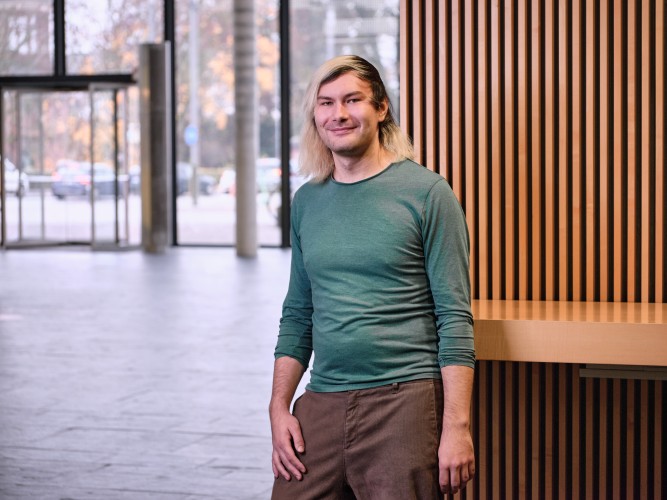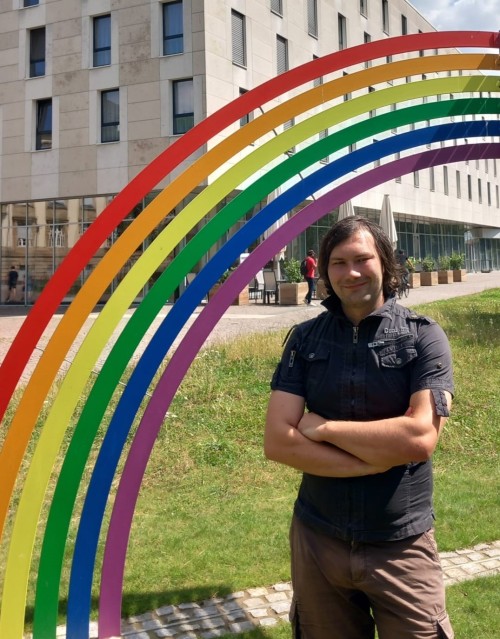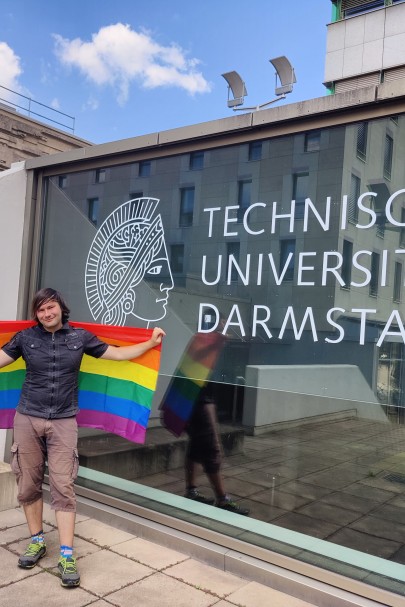Published: 17 Aug 2022, last edit: 17 Aug 2024
When Ambassador Richard started his studies at TU Darmstadt, he thought that as an East German, a working-class child, a previous dropout and a homosexual, he would be alone, isolated from the rest. However, he soon found out that a large number of other students came from similar situations and had also started their studies. Ambassador Richard is now taking a closer look at TU Darmstadt's diversity strategy.
Richard,
Biology and Chemistry Teaching at Secondary Schools
‘As a student who is part of a minority, I sometimes feel left alone by society. I would like to thank the university for setting the course for more acceptance, tolerance and inclusion with its diversity strategy, so that these feelings of loneliness become less.’

TU Darmstadt welcomes the diversity of students of different (social) backgrounds, religion, sexuality, skin colour, gender, age and much more. The diversity strategy of the Technical University of Darmstadt has been in place since 2023. This strategy has set itself the goal of further strengthening diversity on campus with three focal points.
Analysing and Changing Structures
Before improvements can be made in the field of diversity, the forms in which discrimination still takes place on campus must first be observed so that targeted measures can then be taken. The focus here is on analysing and changing structures. One example of this is the accessibility of buildings.
People with physical disabilities are dependent on access to the buildings that meets their needs so that they can take part in events. This can lead to problems for wheelchair users in particular. It is therefore important that the university addresses solutions for this. However, this focus must not stop at architectural challenges. Discriminatory structures in teaching must also be uncovered and permanently eliminated.
The strategy includes the following goals in this regard:
- ‘Conducting and analysing surveys among associates of TU Darmstadt regarding diversity to identify needs an appropriate measures to be taken, to coordinate and modify standardised surveys in a diversity-sensitive manner with the respective offices and units in charge […].
- Promoting, supporting and organising opportunities to firmly establish training and continuing education offers on diversity.’
Demanding and Promoting Diversity
Another focus of the TU's strategy is the topic of demanding and promoting diversity. Discrimination can occur for various reasons, such as sexuality or religious affiliation. This does not necessarily take the form of open exclusion stereotyped from films à la ‘You're not allowed to join in because you're gay’, but rather a more nuanced level at which only those discriminated against still experience the discrimination, for example when, after coming out, same-sex friends avoid situations where they are alone with the person or when the lecturer is talking about the behaviour of women (which is already sexist in itself) and looks a little too intensely at the queer student. Such so-called microaggressions should not only be reduced, but diversity should be promoted at the same time.
To this end, inclusion and equal opportunities are to be strengthened. Contrary to the general misconception, this does not mean that everyone should be given the same opportunities, but that those who need it more urgently should receive more individualised support.
The following goals of the strategy are examples of this:
- ‘Adapting application processes and selection procedures fairly and sensitively in terms of diversity by using advertising texts and specific leadership training that promote diversity;
- Providing alternative forms of learning and examination, including examinations made anonymous;

Campus Stadtmitte Memorial
Ambassador Richard at Campus Stadtmitte in front of the memorial to the victims of Article 175 StGB, the so-called ‘gay paragraph’, according to which homosexual men were criminalised in Germany for a long time.
Critically Questioning Actions
As we have all grown up in a discriminatory environment, we will all inevitably unconsciously fall back into discriminatory patterns from time to time. However, as soon as you realise that these patterns are occurring, you don't have to feel like a bad person, but rather question why this pattern has occurred and why it is wrong. This is the third focal point: critically questioning actions. Openly dealing with mistakes is essential for this.
A person who makes homophobic statements, for example, should not simply be branded as homophobic and ultimately cancelled. This would not lead to a rethink on the part of the person and would harden the fronts. The person would feel strengthened in their beliefs and become radicalised in their faith.
I have come to the conclusion that it is much more important to seek dialogue with such a person and give them the opportunity to change. The strategy contains the following objectives on this point:
- ‘Introduction to and documentation of good-practice examples in teams; […]
- Extending the training of tutors and mentors; […]’
Overall, the conclusion for me is that TU Darmstadt is very strongly committed to promoting diversity. In my teacher training programme, I can also confirm that the topic is becoming increasingly relevant within the course content. The diversity strategy has an elaborate list of specific goals to be achieved for all three priorities. You can read them here:
TU Darmstadt Diversity Strategy (opens in new tab)
Strategy Development of TU Darmstadt





